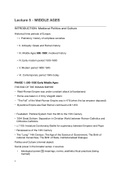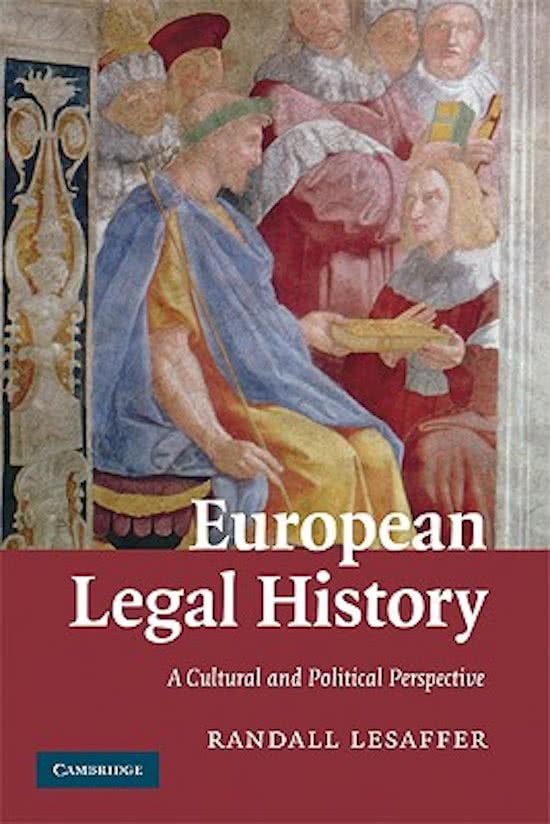Lecture 5 - MIDDLE AGES
INTRODUCTION: Medieval Politics and Culture
Historical time periods of Europe:
• I. Prehistory: history of scriptless societies
• II. Antiquity: Greek and Roman history
• III. Middle Ages 500-1500: medieval history
• IV. Early-modern period 1500-1800
• V. Modern period 1800-1945
• VI. Contemporary period 1945-today
PHASE 1: 500-1050 Early Middle Ages
THE END OF THE ROMAN EMPIRE
- West-Roman Empire was under constant attack (of barbarians)
- Rome was taken in 410 by Visigoth Alaric
- “The Fall” of the West-Roman Empire was in 476 (when the las emperor deposed)
- Byzantine Empire aka East Roman continued until 1453
• Feudalism: Political System from the 9th to the 15th Century
• 1054 Great Schism: Separation in Christian World between Roman-Catholics and
Orthodox-Catholics
• c.1100: Investure Controversy Battle for supremacy between Emperor and Pope
• Renaissance of the 12th Century
• The “Long” 14th Century: The Age of the Science of Government, The Birth of
national monarchies, The Birth of State, Institutionalised Dialogue
Politics and Culture (=formal object)
Social power in the broader sense: 4 sources
• Ideological power meanings, norms, aesthetic/ritual practices (being
married)
1
🡪
, • Economic power - money
• Military power - related to money; physical force/violence; exercise of
coercion
• Political power - institutionalized regulations and coercion that are centrally
administered & territorially bounded
Social power in the narrow sense: capability to establish and control social
networks of mutually obliging relations through gift exchange, creating bonds
through exchange & con ict settlement
• e.g. Solving con icts through giving gifts (giving daughter to another family)
• Creating bonds instead of going to war
Middle Ages are very symbolic. Most often a reference to God power has a
symbolic meaning
• e.g. King giving power/material stu to nobleman
FROM POWER TO STATE
Sources of Social Power according to Man (1986): Derived from the Capability to
monopolise
Ideological power: Meanings, norms, aesthetic and/or ritual practices
Economic power: Circuits of production, Distribution, Exchange, and Consumption
Military power: Physical force (violation), exercise of coercion and control over
people
Political Power: Institutionalised regulations and coercion which are centrally
administered and territorially bounded
Social power: The capability to establish and control social networks of mutually
obliging relations through 1.gift exchange 2.other ways of creating bonds through
exchange (e.g. marriage and vassalage) 3.con ict settlement
What is a state?
Sovereignity is the exclusive right to complete control over an area of governance,
people, or oneself
States: “Coercion-wielding organisations that are distinct from households and
kinship groups and exercise clear priority in some respects over all other
organisations within substantial territories”
Wikipedia => A state is a political association with e ective sovereignty over a
geographic area
2
fl fl ff fl ff 🡪
, A nation: A self-de ned cultural and social community; a people living in their ‘own’
territory and distinguished from other nations by their ‘own’ history, identity, culture,
language and possibly religion
National states: States governing multiple contagious regions and their cities by
means of centralized, di erentiated, and autonomous structures
Nation-state: a state whose people share a strong linguistic, religious and symbolic
identity
RISE OF CHRISTIANITY:
• Augustine sees Christianity is spreading develops the idea of spiritual “city
of God”. Church is the spiritual city of God (concept/structure in the head of
people)
RISE OF ISLAM
• Mohammed
• Europe sees Muslims arrive in their own territories
• Muslim territory expands to central Asia
• 710-1492: Christians, Jews, Muslims living together
ECONOMY AND SOCIETY
• Rise of towns, markets, money economy
• Free farmers; demographic boom
• The Plague in 14th century
• Rise of commercial
MEDIEVAL RELIGION
• Institutional religion
• Popular religion; ideas that people have
◦ Devil
◦ Power of relics (bones of the Saints have power)
◦ Miracles/magic
◦ Eucharist and sacraments
EUROPE AND THE WORLD
• European expansion to east and south
◦ Fall of Constantinople
• European expansion to the west; Columbus
3
fi ff 🡪






